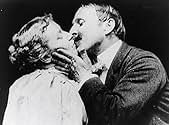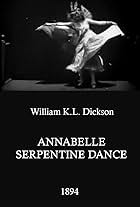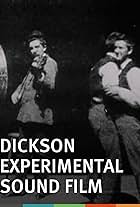IMDb RATING
5.8/10
3.8K
YOUR RATING
In a medium closeup shot of the first kiss ever recorded on screen, two fervent lovers cuddle and talk passionately at a hair's breadth, just before the love-smitten gentleman decides to giv... Read allIn a medium closeup shot of the first kiss ever recorded on screen, two fervent lovers cuddle and talk passionately at a hair's breadth, just before the love-smitten gentleman decides to give his chosen one an innocent peck.In a medium closeup shot of the first kiss ever recorded on screen, two fervent lovers cuddle and talk passionately at a hair's breadth, just before the love-smitten gentleman decides to give his chosen one an innocent peck.
- Director
- Writer
- Stars
- Awards
- 1 win total
- Director
- Writer
- All cast & crew
- Production, box office & more at IMDbPro
Featured reviews
10rudy-46
This very small piece of film history is a real cinematic treasure. We are very fortunate it is still with us to be enjoyed and appreciated, for a kiss has become almost synonymous with the birth of cinema. When one thinks of the movies' beginning, the image of May Irwin and John Rice come to mind. These very early films were typical of the period, the decade of the 1890's. Very short films lasting under a minute designed for the Edison kinetoscope to be viewed in "peep show" parlors. This film is not only important for its historical value, but we get the rare privilage of seeing the fabulous Broadway actress, May Irwin repeating for the camera a scene from the popular play "The Widow Jones". Miss Irwin was a very prolific actress of the late 19th and early 20th century. To my knowledge she made only one other film, 1914's "Mrs. Black is Back". Though her presence in "The Kiss" is very brief, we get a big glimpse of an eminent actress.
Hearing what a scandal this caused, you have to wonder what the 1890-oids would think of what goes into movies today. But considering its only about 10 seconds long, you really have got to see this movie. Its a historical landmark. First romance ever filmed people, are you really going to miss that??
Imagine if kissing on screen was still a social taboo? Imagine every romance movie ever made ( Casablanca, Titanic, Breakfast at Tiffany's, Romeo and Juliet, etc. ) minus any physical affection whatsoever. it would be a lot more weird and a lot less fun. Think of what we owe to this film. I think we kind of owe these guys aprox. 10 seconds of our time.
Imagine if kissing on screen was still a social taboo? Imagine every romance movie ever made ( Casablanca, Titanic, Breakfast at Tiffany's, Romeo and Juliet, etc. ) minus any physical affection whatsoever. it would be a lot more weird and a lot less fun. Think of what we owe to this film. I think we kind of owe these guys aprox. 10 seconds of our time.
There is not much to this film. It was made for Kinetoscope parlors with peep-show machines, and was probably rarely shown on a big screen (at least in the 1890s). It features May Irwin and John Rice in a short scene from their Broadway stage success THE WIDOW JONES.
The important thing about this film is the camera placement. Intead of seeing the actors full-length as if photographed on a stage, the photographer placed the camera near them so that we can clearly see their faces. The actual kiss is an innocent kiss as an old husband would kiss his wife. However, the closeness of the images disturbed many Victorian era people who felt a kiss was a private moment and should not be seen in public. While neither Irwin or Rice went on to make many more films, they were certainly some of the first celebrities to be immortalized on film. Looked at in this context, it is certainly an interesting little film.
The important thing about this film is the camera placement. Intead of seeing the actors full-length as if photographed on a stage, the photographer placed the camera near them so that we can clearly see their faces. The actual kiss is an innocent kiss as an old husband would kiss his wife. However, the closeness of the images disturbed many Victorian era people who felt a kiss was a private moment and should not be seen in public. While neither Irwin or Rice went on to make many more films, they were certainly some of the first celebrities to be immortalized on film. Looked at in this context, it is certainly an interesting little film.
I discovered silent movies one day when I was too sick to go to school and the local educational TV station ran several of them. That was where I was exposed to this early Edison short. Later I discovered this simple film, showing nothing more than 2 people kissing, was blasted by clergyman who used such terms as "A lyric of the stockyards" to describe this intimate act blown up larger than life and projected on a screen. Here moving pictures were still in their infancy and already certain people who let zealotry replace common sense were calling for censorship! Some things never change! We are lucky that so many Edison shorts survived for us to see these days. You have to wonder what all the fuss was about.
As short and simple as it is, this is still an interesting historical landmark, as one of the first movies to be surrounded by public controversy. Some of the other early movies are remembered for the initial surprise they caused (for example, the fear that some audiences felt when they first saw footage of a train coming towards the camera), but the reaction to this movie was different.
Given the accounts of the reactions that it caused, the footage itself seems surprisingly innocuous. The participants in "The Kiss" are neither young nor attractive, and their feelings towards each other seem more affectionate than sensual. That it caused such comment in its time no doubt speaks in part to what that generation was concerned with, but even at that, surely most persons had seen this kind of behavior before.
What made this different was that it was projected on a large screen for all to see, and that an intimate moment had been captured in a form that could be preserved forever and replayed over and over. Unlike a stage scene, a movie is never really over and forgotten, since audiences can still see it many decades later. Also unlike a stage scene, a movie camera could capture the scene in a (medium) close-up, bringing the viewer much closer to the kissing couple.
A movie also captures the entire sequence of events, so that the impression of what is happening is fleshed out in its entirety, making it more memorable than even the most well-chosen moment for a still photograph. All of these thoughts may not fully explain it either, but the fact remains that, though there are certainly some different things that other media can do better than cinema, this was an early example of what movies can do to a degree that other art forms cannot quite rival.
Given the accounts of the reactions that it caused, the footage itself seems surprisingly innocuous. The participants in "The Kiss" are neither young nor attractive, and their feelings towards each other seem more affectionate than sensual. That it caused such comment in its time no doubt speaks in part to what that generation was concerned with, but even at that, surely most persons had seen this kind of behavior before.
What made this different was that it was projected on a large screen for all to see, and that an intimate moment had been captured in a form that could be preserved forever and replayed over and over. Unlike a stage scene, a movie is never really over and forgotten, since audiences can still see it many decades later. Also unlike a stage scene, a movie camera could capture the scene in a (medium) close-up, bringing the viewer much closer to the kissing couple.
A movie also captures the entire sequence of events, so that the impression of what is happening is fleshed out in its entirety, making it more memorable than even the most well-chosen moment for a still photograph. All of these thoughts may not fully explain it either, but the fact remains that, though there are certainly some different things that other media can do better than cinema, this was an early example of what movies can do to a degree that other art forms cannot quite rival.
Storyline
Did you know
- TriviaA fifteen-second kiss by May Irwin and John C. Rice brought the first demand for film censorship.
- ConnectionsEdited into Sixty Years of Seduction (1981)
Details
- Release date
- Country of origin
- Language
- Also known as
- The John C. Rice-May Irwin Kiss
- Production company
- See more company credits at IMDbPro
- Runtime1 minute
- Color
- Sound mix
- Aspect ratio
- 1.33 : 1
Contribute to this page
Suggest an edit or add missing content



















